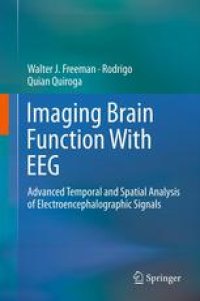
Ebook: Imaging Brain Function With EEG: Advanced Temporal and Spatial Analysis of Electroencephalographic Signals
- Tags: Neurosciences, Neurochemistry
- Year: 2013
- Publisher: Springer-Verlag New York
- Edition: 1
- Language: English
- pdf
The scalp and cortex lie like pages of an open book on which the cortex enciphers vast quantities of information and knowledge. They are recorded and analyzed as temporal and spatial patterns in the electroencephalogram and electrocorticogram. This book describes basic tools and concepts needed to measure and decipher the patterns extracted from the EEG and ECoG.
This book emphasizes the need for single trial analysis using new methods and paradigms, as well as large, high-density spatial arrays of electrodes for pattern sampling. The deciphered patterns reveal neural mechanisms by which brains process sensory information into precepts and concepts. It describes the brain as a thermodynamic system that uses chemical energy to construct knowledge.
The results are intended for use in the search for the neural correlates of intention, attention, perception and learning; in the design of human brain-computer interfaces enabling mental control of machines; and in exploring and explaining the physicochemical foundation of biological intelligence.
The scalp and cortex lie like pages of an open book on which the cortex enciphers vast quantities of information and knowledge. They are recorded and analyzed as temporal and spatial patterns in the electroencephalogram and electrocorticogram. This book describes basic tools and concepts needed to measure and decipher the patterns extracted from the EEG and ECoG.
This book emphasizes the need for single trial analysis using new methods and paradigms, as well as large, high-density spatial arrays of electrodes for pattern sampling. The deciphered patterns reveal neural mechanisms by which brains process sensory information into percepts and concepts. It describes the brain as a thermodynamic system that uses chemical energy to construct knowledge.
The results are intended for use in the search for the neural correlates of intention, attention, perception and learning; in the design of human brain-computer interfaces enabling mental control of machines; and in exploring and explaining the physicochemical foundation of biological intelligence.